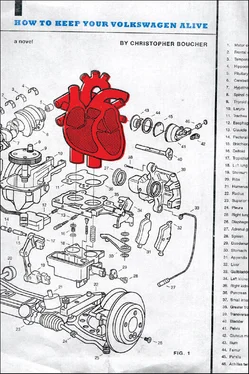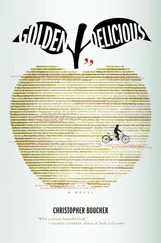Which is exactly what happened when, early that winter, the VW developed an interest in engineering. Somewhere along the way, he’d picked up a book on the subject at one of the used bookstores. He read that book cover to power, and was soon buying other books on the subject, which he carried in his front compartment and read while he was waiting for me. He didn’t talk to me about what he was reading, but I saw from the books’ covers that one of them was about small engine repair and another about automotonal technology.
Soon, he’d turned his room/garage into a workshop and started building projects; he spent all his free time using materials I didn’t recognize to build machines I didn’t understand. He wouldn’t tell me what these projects were — he was still not really speaking to me — and I didn’t want to pry, but one Saturday afternoon I was in the kitchen making soup when the VW opened his bedroom door and said, “Hey Dad?”
“Yo,” I said.
“Remember when we used that outboard motor to get through the Main Street canal?”
“ ‘Shimmies and Shakes?’ ”
The VW nodded.
“You just fastened the engine to the sheet metal, right?”
“Right,” I said.
“Cool,” he said, and he started to close the door.
“Wait a second,” I said. “Why?”
“Just curious,” he said, and slammed the door.
One day soon after that, I heard muted construction noises — singsong saws, choruses of hammers — coming from the VW’s room. I knocked on the door, and when the VW appeared his face was sooty. “What?” he said.
“What’s going on in there?” I said. “I hear the sound of carpentry. What are you doing?”
“Nothing,” he said.
I put my hands on my hips.
“I’m just listening to music is all,” said the VW.
There was a smell coming from his room — the smell of welding. “What kind of music ?”
“Just — a band, Dad, alright?”
“What band?”
“The—” The VW paused, and then his face brightened. “The Carpenters.”
“Oh,” I said. “Cool.” That made sense. The Carpenters were a real band who made music in the 1970s — One Side of My Mother used to sing me their songs.
I should have read the roadsigns — should have remembered that The Carpenters, despite their name, did not really make construction-style music. Or I should have asked more questions when, a few days later, a problem came to the door with some sheets of tin. “Delivery for a Mister—” he read the paperwork—”Nineteen seventy-one—”
“That’s for me,” said the VW, coughing. He signed for the delivery, picked up the tin and carried it back to his bedroom/garage.
“Wait a second,” I said. “What’s all that tin for?”
The VW ignored me.
“VW,” I said.
The VW turned towards me, and his face audited my face. “You know what?” he said. “It’s a surprise. A present! It’s for a present for you. OK?”
“A present ?”
“For your birthday,” the VW. “Alright?”
“Seriously?” I said. “Is that why you’ve been so secretive?”
The VW just stared at me.
This did strike me as strange — my birthday wasn’t for six months — but I didn’t question it at the time. “Wow — that’s really thoughtful of you, kiddo,” I said. “I won’t even try to guess what it is then. That way I can be surprised!”
The VW gave me a thumbs-up sign, picked up the sheets of tin and carried them into his room.
He spent the entire next day in his room with the door closed. That night, I was sitting in the living room, reading a diagnostic about wind narratives — stories written and composed, entirely, of wind — when the VW opened the door. Billows of smoke spilled into the living room. “VW!” I said. “What are you doing in there?”
“I was — reading,” he said.
“What’s all that smoke from?”
“What smoke?” the VW said.
“I smell smoke,” I said.
“You do? I don’t,” said the VW.
I shook my head and went back to my reading.
The VW stepped into the living room. “I’m going to sleep now,” he said.
“OK. Goodnight,” I said.
He didn’t move. “Dad?” he said.
I looked up from my reading.
The VW’s eyes were bleary. “Can I say something?”
“Sure,” I said.
He seemed to weigh his words carefully. “Just, sorry for all the trouble I’ve caused you.”
“What — the noise?” I said.
The VW idled.
“No problem,” I said. “It sounds like you’re really taking an interest in carpentry composition, which is great. Your grandfather would be really proud of you.”
I turned back to my reading, but when I looked up again the VW was still standing there. “You OK?” I said.
His engine stalled. “This was always the way it was supposed to go. OK?”
“I don’t know what you’re talking about,” I said. “The way what was supposed to go?”
“The next chapter,” he said.
“Wait — what?” I said. “What about the next chapter?”
“The futuresongs,” he said.
“VW,” I said, “Can this wait? I’m in the middle of this excursion on literary windstorms. Can we talk about this another time?”
His eyes wednesdayed. “Sure we can,” he said.
He went to his room, and I turned back to my reading about the wind. It was a captivating chapter. Was this was the problem with my power — that it lacked wind? Every word in my stories just sat there on the page, not moving at all.
For a few minutes after that I heard the sounds of construction from the VW’s room — the revving of engines, the whining of a saw. Then the noise stopped, and the apartment was completely quiet.
GOLD RUSH
That morning, I woke up early and booked for a while. I’d collected a few Northamptons over the past weeks, as the bookstore bridge had suggested, but fitting them into the book was another matter — I often had to bend the stories, or break them and reshape them. I began that particular day by taking out the ogeltree to clean it, but then I snapped a piece of the plastic by mistake. I called around and found a place that had one — Amherst Typewriter — and then I knocked on the VW’s door. It was only eight in the morning, so I assumed that he was still asleep. “Storytime, VW,” I said.
The VW often slept late, and sometimes slept through the day if he was sick, but he usually mumbled something — a custom-made, a u-turn-term — when I woke him up. That morning, though, he didn’t say anything.
“Kiddo,” I said, “we need to get to Amherst — I need an ogeltree for the book. Can we leave in ten minutes?”
Again, no answer.
“Hey.” I knocked again. “Ten minutes, OK?”
I put my ear to the door. “VW?” I didn’t hear anything. “You’re worrying me — are you OK?”
He wasn’t answering.
“I’m going to open this door now, alright? VW? I’m opening the door.”
I opened the door into a plume of engine parts, books, tools, maps.
But there was no VW. The VW was gone.
VIII. VOLKSWAGEN DOESN’T STOP
TRANSMISSION II (SLIPS AND JERKS)
Your Volkswagen will lead you through multiple versions — this version and others as well. Don’t read this as a malfunction — this is how Volkswagen Beetles (and/or books about Volkswagen Beetles — Muir’s, mine, or anyone else’s) work! They move, they shift, they change.
Sometimes, though, one of the transmissions can un shift. You can lose ground. You shouldn’t worry if your VW shifts or revises, but you should absolutely worry if the car stops shifting, or if the version stays constant. If that happens, something is wrong.
Читать дальше












